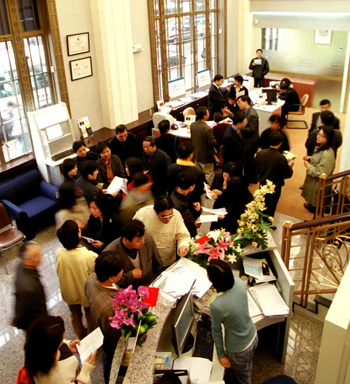| Tools: Save | Print | E-mail | Most Read |
| China Questions and Answers |
| Adjust font size: |
Q: When China accessed the WTO, it pledged to gradually open its financial sector. How is this going? What measures will be taken to further open the financial sector? What sort of competition will domestic financial institutions face after the original policy protection ends? A: Gradual opening of the financial sector is a solemn commitment China made when it entered the WTO at the end of 2001, and the task is being carried out in earnest. In 2004, Kunming, Beijing, Xiamen, Xi'an and Shenyang were added to the 13 cities already open to foreign-funded financial institutions—Shanghai, Shenzhen, Tianjin, Dalian, Guangzhou, Zhuhai, Qingdao, Nanjing, Wuhan, Jinan, Fuzhou, Chengdu and Chongqing. To promote economic development in west and northeast China, Xi'an and Shenyang were opened to foreign-funded financial institutions one year in advance. Through the end of 2004, a total of 62 foreign banks of 19 countries and regions had set up 204 operational entities in the Chinese mainland, with 105 of them permitted to engage in RMB business. As well, about 40 foreign insurance companies had set up 70 joint ventures in China. According to the timetable of China's WTO commitment, the government will continue to take the following measures: First, the procedures for examining and verifying the qualification of profitability of foreign bank branches in west and northeast China that apply for engaging in RMB business will be relaxed—that is to say, examination and verification of the profitability of the applicant branch will be changed to that of all the branches of the bank in China. Second, applications from foreign banks to set up branches in west and northeast China will be given a green light and have priority of being examined for approval over others with the same qualifications. Third, when foreign financial institutions apply to set up representative offices in China, applicants can directly submit their applications to the China Banking Regulatory Commission (CBRC). When foreign financial institutions change chief representatives, local banking regulatory departments are eligible to examine and approve the qualifications of people to take the post. Fourth, since January 1, 2005, foreign banks have been allowed to work as insurance agents for their approved customers and businesses according to relevant regulations, after being recorded in local regulatory banking departments. In addition, the CBRC will speed up the examination and approval of foreign banks to set up additional branches in the same city and open business of RMB or derivatives, so as to create a more relaxed environment for the development of foreign-funded banks. After China's entry into the WTO, its financial sector inevitably faces great challenges. Especially after the original market access barrier to the banking sector is eliminated, all Chinese banks will have to compete with their foreign counterparts on an equal footing, and this will be a severe test to state-owned commercial banks with a high ratio of NPLs. What most impacts China's financial sector is not foreign financial capital, but the advanced items and means of foreign financial services, such as information consulting, investment advice and family wealth management. In 2005, China will also allow qualified foreign financial institutions to issue RMB-denominated bonds in China, indicating a further increase in China's economic strength and the increasingly wide recognition of RMB credit. To allow international development institutions to issue RMB bonds is the first step. With China's further opening up to foreign capital, qualified foreign financial institutions will also be allowed to be listed on China's stock market.
|
| Tools: Save | Print | E-mail | Most Read |
 |
| Related Stories |
|
Product Directory China Search |
Country Search Hot Buys |
